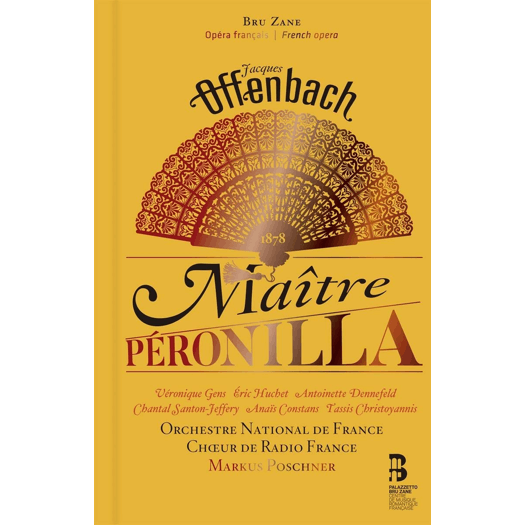 SPONSORED: So Much, for So Many. R Murray Schafer's 'My Life on Earth and Elsewhere', read by A P Virag.
SPONSORED: So Much, for So Many. R Murray Schafer's 'My Life on Earth and Elsewhere', read by A P Virag.
All sponsored features >>

A Precious Recording
GIUSEPPE PENNISI listens to
Offenbach's 'Maître Péronilla'
'... this is a book and two CDs to enjoy and to make an elegant gift.'
This is a precious recording of an almost unknown work by Offenbach: Maître Péronilla, an opéra bouffe in three acts of 1878. It is the first time that it is offered unabridged – in the past, some of its numbers had been included in anthologies of Offenbach's operatic work. It is presented in two CDs inserted in a hard cover book of 174 pages. The book includes the libretto and interesting studies by musicologists such as Alexandre Dratwicki, Gérard Condé, Jean-Claude Yon and Étienne Jardin as well as press reports about the 1878 debut. It is a new release by that mine of goodies which is the Venice-based Palazzetto Bru Zane Centre de Musique Romantique Française.
This opéra bouffe or opéra comique - the terminology is a matter of debate - has been forgotten for one hundred and forty years. However, it is worth proposing the work again either in concert version or as a high quality recording (like this one) granted that a fully staged production may be too costly as it entails twenty-two characters and at least eighteen singers, some of them doubling up in more than one role.
The libretto is by the composer, together with Charles-Louis-Étienne Nuitter and Paul Ferrier. The sub-title is La femme à deux maris; the working title during the preparation of the libretto and composition had been Frimouskino, which Offenbach had drafted in the late 1860s. Composed in Nice, Offenbach asked Nuitter and Ferrier to help him with the song lyrics as his regular collaborators, Meilhac and Halévy, had distanced themselves in order to concentrate on other projects. Premiered at the Théâtre des Bouffes Parisiens, performances of Offenbach's work were discontinued after less than two months, and Léon Vasseur's operetta Le timbale d'argent returned to the Bouffes Parisiens.
The libretto is not one of the best Offenbach worked on, and could very well have been one of the determinants for its demise from Paris theatres. It is a rather involved intrigue about marriages with a solution in a rather funny court of law. Some situations are hilarious; some are not. However, the score is very refined, at least at par with Offenbach's other operettas and with anticipations of his incomplete masterpiece, Les contes d'Hoffmann.
The work is one of several by Offenbach with Spanish connections and with references to a Spanish context and music: Pépito, La Duchesse d'Albe and Les bavards. 'There is more Spain in Offenbach's brain than in Spain itself', said a journalist entranced by Le Maître Péronilla. Understandably so, given the charm and humour of this operetta in which no fewer than twenty-two characters are kept busy unravelling a preposterously complicated love story. Castanets, tambourines and triangle merrily punctuate this score, which multiplies impressive vocal ensembles while not renouncing intimate numbers of great poetry.
It can be said that allegro con brio is the main element of the three acts - about one hundred minutes altogether with a longer first act (when the intrigue of the plot is set) and a shorter second and third acts (when the comic machinery is unravelled and there is a happy ending for all the characters).
The atmosphere is clear from the introduction.
Listen — Offenbach: Ouverture (Maître Péronilla)
(CD1 track 1, 0:00-0:59) © 2020 Palazzetto Bru Zane / Radio France :
It is even more evident from the entrance aria of Maître Péronilla, a former lawyer and now the main producer of chocolate in Madrid. He wants his daughter to be married to a man of his choice.
Listen — Offenbach: Oui, je le dis, et m'en fais gloire (Maître Péronilla Act I)
(CD1 track 8, 0:00-0:37) © 2020 Palazzetto Bru Zane / Radio France :
The musical number contains two couplets; the first is sung by Maître Péronilla (Éric Huchet), the second by his daughter Manoëla (Anaïs Costans) and the conclusion by all the singers on stage.
The song La Malaguenia (used by Offenbach in other works after the poor reception of Le Maître Péronilla at the Théâtre des Bouffes Parisiens) is very Spanish.
Listen — Offenbach: D'où viens-tu, chanson nouvelle? (Maître Péronilla Act II)
(CD2 track 7, 0:00-0:58) © 2020 Palazzetto Bru Zane / Radio France :
It is sung by Chantal-Santon-Jeffery in the role of Alvarès, Manoëla's lover and all the characters as well as the chorus join in.
The rondeau by Antoinette Dennefeld as Frimouskino - one of the master minds of the intrigue - is simply charming.
Listen — Offenbach: Je pars, je vais, je vole (Maître Péronilla)
(CD2 track 4, 0:00-0:50) © 2020 Palazzetto Bru Zane / Radio France :
Most of these singers are specialists of this repertory - eg Éric Huchet and Loïc Félix. The cast also includes an operatic soprano known mostly for a dramatic role: Véronique Gens as Léona, a thirty-nine-year-old lady in love with Don Guardona, the old man Maître Péronilla would like to become Manoëla's husband. Ms Gens has a charming and very Spanish ballad in the first act.
Listen — Offenbach: Il était un joli jeune homme (Maître Péronilla Act I)
(CD1 track 10, 1:26-2:04) © 2020 Palazzetto Bru Zane / Radio France :
In short, this is a book and two CDs to enjoy and to make an elegant gift.
Copyright © 7 March 2020
Giuseppe Pennisi,
Rome, Italy

CD INFORMATION - OFFENBACH: MAÎTRE PÉRONILLA
FURTHER INFORMATION - JACQUES OFFENBACH
FURTHER INFORMATION - PALAZZETTO BRU ZANE



